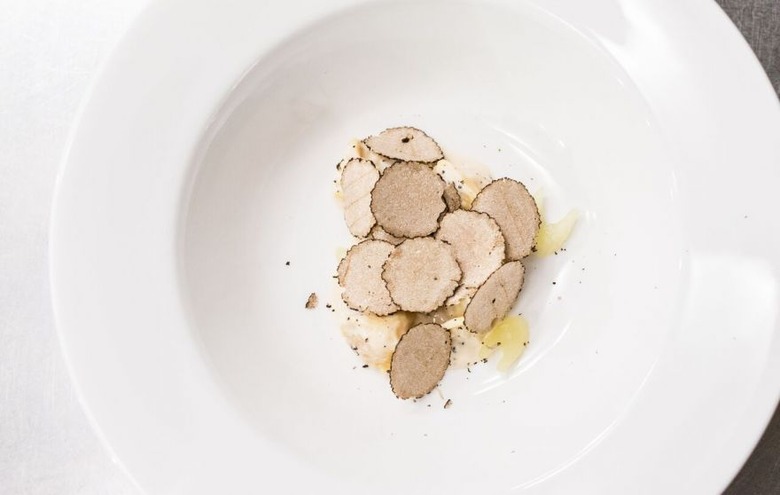Spam Goes From The Can To The Bag, But Will It Work?
Spam may not be first cut of meat that comes to mind when you think of gourmet cuisine.
But to many Hawaiians this canned pork product is a staple for casual eating and even fine dining.
"Spam is a really popular product in Hawaii, most of us grew up with it as kids," says chef Chung Chow of New York City's Noreetuh Hawaiian restaurant. "The most popular is probably the Spam musubi. They're sold everywhere– 7-Eleven, McDonald's even," he says of the snack made of a slice of grilled Spam on top of a block of sticky rice, wrapped together with nori seaweed.
A more modern favorite is Spam Agnolotti served with shaved burgundy truffles, celery, parmigiano-reggiano cream– that's right, truffles with Spam.
"Spam isn't in everything we do but we love to show people who may be afraid that it's really like any other meat. You really can use it anywhere you'd use pork or beef," says Chow of his cuisine.
Now after 78 years in a tin, Hormel is capitalizing on the popularity of protein-packed snacking with new bite sized nuggets– Spam Snacks. They come in three flavors: Classic, Bacon and Teriyaki, each with up to10 grams of protein and about 200 calories per pack.
"Our primary target is really all of the Spam fans out there to give them a whole new way to enjoy the taste they love," says Jen Nolander, Senior Brand Manager of Spam Family of Products told FoxNews.com.
Spam was first launched by Hormel in 1937. During World War II, the canned meat became a staple in soldiers' meal kits and the popularity of the product continued to rise through the 1950s.
Today there are 15 different canned versions of Spam. The recipe for classic canned Spam contains pork shoulder shredded with ham, water, potato starch, salt, sugar, pork flavor (which includes rendered pork fat, lactic acid, salt, and sodium nitrite).
Over the years, the processed meat product has received a lot of flack for additives and preservatives, especially as consumers become more health conscious—an issue of which the company is well aware.
"One of the criticisms we always hear is that people think there's a ton of extra things in the product," Jen Nolander, Senior Brand Manager of Spam Family of Products told FoxNews.com. "People tend to fear what they don't know. There are some people who have never tried and it does kind of get a bad rap."
The new Spam Snacks do contain preservatives like sodium phosphates and potassium chloride. But Nolander notes that each version is gluten free –which may appeal to new consumers and loyal patrons alike.
So we decided to let a long-time Spam fan –Chef Chow –have a taste to get his impressions.
First up was the classic flavor.
"This actually tastes like what Spam is, the real product itself," said Chef Chow. "Maybe just a bit dehydrated." It reminded him of a chewier, meatier bacon that would make a good alternative to throwing plain old bacon bits on a salad.
Other tasters who weren't familiar with Spam likened the product to a chewier jerky.
"I never would have considered myself a Spam eater but this is basically just like a dried pork jerky," said one taster. "It's not too salty which is surprising."
The Bacon flavor packs a bit more smoke and salt than the original.
"It's like a chewy bacon bit," said one taster. "I won't lie, I don't hate it and it's basically like a nugget of Slim Jim. I just don't want to think about what's really in there."
The most divisive flavor was the Teriyaki which is coated in thin film that neither the Bacon nor the original Snack bites have.
"We've seen a ton of big Hawaiian and Asian influence lately in the market so that was important to us as well," Nolander said of the Teriyaki flavor. Per capita, Hawaiians are America's biggest consumers of Spam so Hormel wanted to make sure the new product hit a home run with its core audience. But the Teriyaki may have missed the mark.
"It doesn't have the true Spam taste to it," said Chef Chow but he did taste typical flavors of soy and sugar used in traditional Teriyaki marinades.
Others weren't as forgiving.
"It's way too sweet which I wasn't expecting. After tasting those [Bacon and Classic] this one has a really gummy mouth texture."
If you want to try for yourself Spam Snacks are currently available in only select markets across the U.S.—all flavors are available in Hawaii—and retail for $2.39 a bag.
Related:
- America's 10 Scariest Haunted Houses
- Someone Is Stealing Prime Cuts Of Beef From Live Cows In Canada
- Butter Sushi Is Latest Food Craze
- Meat Producers Blast WHO Report Linking Processed Meat and Cancer
This article was originally published by Sky McCarthy, Ali Rosen on November 3, 2015

